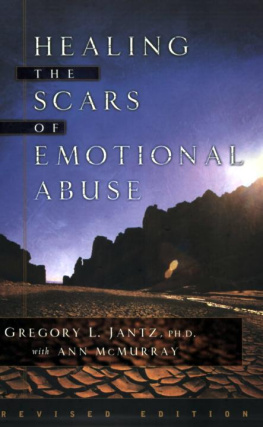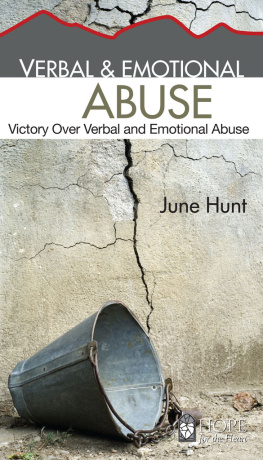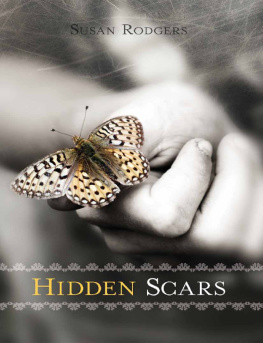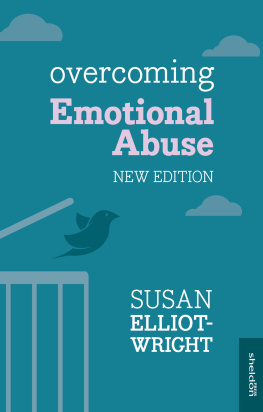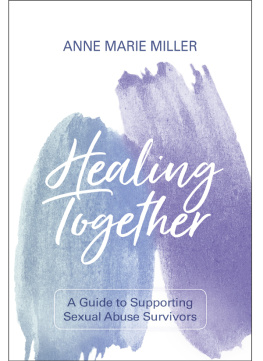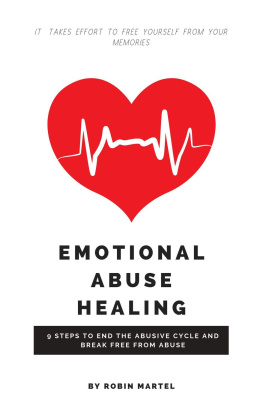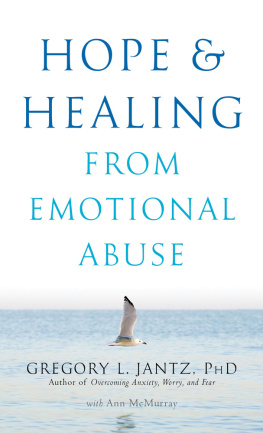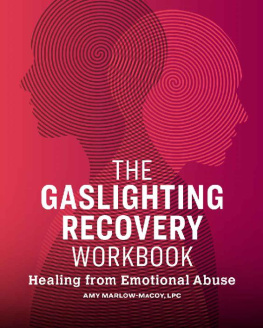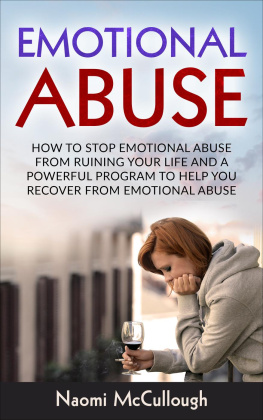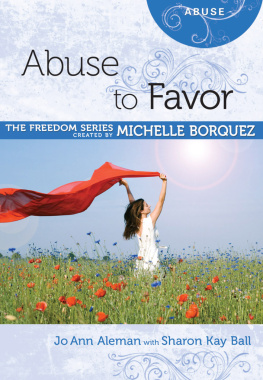Dr. Gregory L. Jantz - Healing the Scars of Emotional Abuse
Here you can read online Dr. Gregory L. Jantz - Healing the Scars of Emotional Abuse full text of the book (entire story) in english for free. Download pdf and epub, get meaning, cover and reviews about this ebook. year: 2003, publisher: Revell, genre: Religion. Description of the work, (preface) as well as reviews are available. Best literature library LitArk.com created for fans of good reading and offers a wide selection of genres:
Romance novel
Science fiction
Adventure
Detective
Science
History
Home and family
Prose
Art
Politics
Computer
Non-fiction
Religion
Business
Children
Humor
Choose a favorite category and find really read worthwhile books. Enjoy immersion in the world of imagination, feel the emotions of the characters or learn something new for yourself, make an fascinating discovery.
- Book:Healing the Scars of Emotional Abuse
- Author:
- Publisher:Revell
- Genre:
- Year:2003
- Rating:3 / 5
- Favourites:Add to favourites
- Your mark:
- 60
- 1
- 2
- 3
- 4
- 5
Healing the Scars of Emotional Abuse: summary, description and annotation
We offer to read an annotation, description, summary or preface (depends on what the author of the book "Healing the Scars of Emotional Abuse" wrote himself). If you haven't found the necessary information about the book — write in the comments, we will try to find it.
Healing the Scars of Emotional Abuse — read online for free the complete book (whole text) full work
Below is the text of the book, divided by pages. System saving the place of the last page read, allows you to conveniently read the book "Healing the Scars of Emotional Abuse" online for free, without having to search again every time where you left off. Put a bookmark, and you can go to the page where you finished reading at any time.
Font size:
Interval:
Bookmark:

HEALING

SCARS
OOF
EMOTIONAL ABUSE
HEALING
THE
SCARS
OF
EMOTIONAL ABUSE
DR. GREGORY L. JANTZ, Pfi.D.
with ANN MCMURRAY
R E V I S E D E D I T I O N





Contents


PART I

UNDERSTANDING
EMOTIONAL ABUSE

ONE

What Is Emotional Abuse?

 avid was eighteen years old when he killed himself. He was never physically beaten or sexually molested by anyone, yet David was the victim of abuse. At the time no one put that name on it. His death was tragic, certainly, but no one ever stopped to think about his life. David died as a result of lifelong emotional abuse-continual, pervasive, easily denied and overlooked emotional abuse. - - - - - - - - -- - -- - - - -David's father had been a football player all through school. He had the same dream for his son. There was just one problem. He never stopped long enough in his pursuit of athletic excellence for his son to ask David if he wanted to be a football player. He just assumed David would want to excel in sports as he had.As expected, David played football growing up. In fact, he did excel at it, being physically large and strong for his age. It was even fun at first-the roar of the crowd, the overwhelming attention lavished on him by his family, the obvious pride others took in his athletic ability. But the pressure to succeed, to live up to his father's expectations, was tremendous. As time went on, no matter how well David did, there was always another level to reach, more he still had to do. No longer was David competing against another team or against other children; instead, he was competing against his father's expectations of how much he himself had accomplished (or thought he had) at the same age.Eventually the pressure got so intense David could no longer cope. When he was fifteen, he tried to kill himself. The attempt failed, but the injuries he suffered because of the attempt left him unable to compete in sports. David had ingested a common poison that settled into his joints, weakening them so that sports were now totally out of the question. Even though he was still alive, David thought he was off the hook. Maybe now his father would stop trying to force him to be a football player and would listen to what David really wanted to be-an artist.The pressure to compete in sports did indeed stop, but so did everything else. David became the invisible person in the family. No longer the focus of his father's sports ambition, David found there was no other place for him in the family. David's sister, Janice, became the athlete of the family. Built strong, like David, she excelled in two sports: track and field and gymnastics. She lettered in both sports in high school and competed at the state level. David's role diminished steadily, outshined by the light of his sister's athletic accomplishments.Completely convinced of his own worthlessness, David gradually lost all hope of ever recapturing his father's attention. His exceptional artistic ability and vision were not valued in his family. Because of David's lack of performance, his birthright had been passed to his younger sister.One spring day, during one of Janice's high school track meets, David escaped to his room. Determined to be successful this time, he put a bullet through his brain with a shotgun.When news of his death became known, everyone agreed it was a terrible tragedy. But then they all remembered, shaking their heads, that he had tried it once before. He always had been a messed-up kid. David's inability to cope with life was attributed to some tragic defect in his personality. No one ever stopped to consider that David had been abused all his life. He had never been beaten or molested, but David died of abuse-emotional abuse. Leaving no marks, it still left him dead. Unacknowledged Abuse As a professional counselor treating eating disorders for almost twenty years, I am very concerned about the often overlooked issue of emotional abuse. For many years I have noticed that the focus of abuse, even the concept of abuse, has centered around the physical beatings, outward neglect, and sexual invasion of children. The signs of emotional abuse, however, are easier to overlook. There is no scar tissue to stretch, no bruises to yellow and heal, no gaping wound to point to. In spite of their invisibility, emotional wounds comprise a very damaging form of abuse.While emotional abuse always accompanies physical and sexual abuse, it can also be present on its own. Because its implications have been overlooked, it has been left to do its damage in silence. The abused have no recourse but to wonder why they just can't seem to get their lives on track. Each will think back to his or her childhood and won't be able to come up with a single time Dad backhanded him across the room, or Mom left her alone for days at a time with no food, or a cousin wanted to do "naughty" things behind the house when the adults weren't looking. These people conclude, therefore, that they were never abused and delve no further into their past to discover why their present doesn't seem to be working.Harder to spot, emotional abuse is easier to deny. But just as physical and sexual abuse have signposts to mark their presence, emotional abuse, being a systematic attack on one's sense of self, has common traits. Just as physical and sexual abuse come in degrees of severity, emotional abuse runs the gamut of intensity and damage. It exists, apart from physical or sexual abuse, as incredibly destructive to an emerging sense of self.All of us have, at one time or another, come under attack by people who just happen to be having a bad day. They take out their frustrations on us, and we feel battered by the winds of their emotions. We have all had it happen to us, and we have all probably been guilty of it a time or two. No one is perfect, and all of us slip up and occasionally say or do things we know we shouldn't. That's normal.Emotional abuse isn't normal. Emotional abuse is the consistent pattern of being treated unfairly and unjustly over a period of time, usually by the same person or people. It can also be a onetime traumatic event that is left unresolved. Emotional abuse is an intentional assault by one person on another to so distort the victim's view of self that the victim allows the abuser to control him or her.In some ways, emotional abuse is the most common form of abuse. It comes from the mother who yells in frustration every time her son makes a mistake, "Why can't you be more like your sister?" Or from the father who snorts in derision as he proclaims regularly to everyone who will listen, "This girl won't amount to nothin'!" It comes from the husband who tells his wife, "You're too stupid to get a job!" Over and over again, the pattern is repeated until the repetition obscures the severity. The son will think to himself, "Mom always says that-what's the big deal?" The daughter will be silent and decide, "It doesn't matter what you think!" The wife deep inside will agree, "I guess I'm not smart enough." Each will attempt to minimize the damage in order to continue on with life as he or she knows it.Like other forms of abuse, emotional abuse can be selfperpetuating, repeating the cycle throughout relationships and across generations. If emotional abuse occurs early in life, it can cause dysfunctional behavior into the adult years.It is important to understand that abuse has a broad definition as well as broad effects. While physical and sexual abuse can he much more visible and therefore are considered more severe, it is vital not to measure abuse on a scale of "bad" to "worse." Rather, it is important to acknowledge its presence, whether in the past or the present. Emotional abuse always accompanies physical or sexual abuse but stands fully on its own as damaging and destructive to an individual.So many of the people I have counseled over the years started out by telling me, "It's not like I was abused or anything...." They then proceeded to recount horror stories of growing up with what I strongly believe is emotional abuse. Too often they seemed embarrassed as they talked, as if fearful of making "too big a deal" out of what had happened to them. Attempting to minimize their abuse is one of the chief denial techniques developed to survive emotionally through the abuse.So how do you know if you have been abused in the past or if the relationship you are in now is an abusive one? Often you aren't the best judge. If you have grown up in an abusive family, your experiences will all have a bizarre sense of normalcy. If you compare your abusive past with a current abusive relationship and vice versa, there will appear to be nothing different to point to the reality of abuse.However, even if you are not the best judge, you are really the only judge. In my counseling, I have found that when people suspect they were abused, in most cases they were. If the relationship you had in the past or the one you have now is with a person or people who consistently make you feel worthless, you are being abused. All of us need relationships with people who love us, who build us up, and who support us as we learn and grow.Of course, not all relationships are perfect, and people say or do things in anger that they regret later. But if those things are a pattern, and if they are used to degrade and control, no matter how subtle they may seem or how much the other person tells you they are really for "your own good," in truth they are abuse. You may be asking yourself, "Where does constructive criticism end and abuse take over?" This book is designed to help you identify the signs and common types of emotional abuse and know what to do about it.Emotional abuse by itself or used in conjunction with physical or sexual abuse is easily recognizable if you know what to look for. Many of the types of abuse identified in this book will take the form of a message-the spoken and unspoken messages passed on to you as a child that constitute the basic structure of your self-identity and self-esteem. These messages, either positive or negative, have become incorporated into how you feel about yourself. Whether you were emotionally abused as a child or an adult, the messages were meant to belittle, devalue, shame, and ultimately control. Additionally, if those messages were given by the very people you looked to for love and guidance, the very ones whose opinions you trusted, they have been given the appearance of validity and have added weight.Just as this book will help you identify the abuse, it will also help you identify the abuser. Emotional abusers have very select ways they use to control those they are abusing. The messages may differ slightly, but the ultimate goal of emotional abuse is control. By controlling those around them, abusers are attempting to control their circumstances and situations.The tragedy is that while sometimes these abusers are aware of what they are doing, often they are not. A habit of abuse has become a life pattern that is so comfortable, so normal for them, that they have stopped questioning the reasons behind their words and actions. As is so often the case in abuse, the abusers have a history of abuse in their own past and are acting out behavior that seems normal to them.As you are reading this book, you may discover that you are perpetuating the pattern of emotionally abusive behaviors yourself. It is vitally important that you accept this truth and continue to work through the book to help bring awareness and hope. If you are emotionally abusive to those around you, now is the time to change your pattern. Be alert to the messages that are being identified as abusive and decide to change. Kindness, compassion, empathy, and affection may not have been characteristics you grew up observing, and therefore you did not have the chance to model them fully in your adult life. If you were raised in an abusive environment and realize you are perpetuating that environment, it is possible to intentionally alter the way you relate to yourself and others. The first step is knowledge-knowing how harmful your behaviors are to those you love, and to yourself, can provide you the motivation to make positive changes.Also, as you are reading this book, you may come face to face with a past or a present that is painful to remember or accept. The goal is not to injure you all over again by bringing up a hurtful past; rather, it is to help you understand the behavior and place it in the proper context of your life. The further goal is to motivate you to avoid repeating the behavior yourself, either through how you relate to others or how you relate to yourself.Remember as you are reading this book that it is important to avoid trying to measure your abuse against some scale. Whether it is a long-term abusive relationship or a onetime traumatic event of rejection that created a later resentment and unresolved anger, it is still damaging. It is vital that you identify it and learn how to deal with its consequences. Acknowledging and becoming aware of abusive patterns in your life will lead to healing and the recovery process. Understanding Emotional Abuse Look over the following signs of emotional abuse and think about your childhood. Think also about any patterns that are familiar to you in your present relationships. Under "Past" mark those that you remember as being a consistent part of your childhood. Under "Present" mark those that are part of your current relationships. If you recognize an abusive behavior or message you are perpetuating in your own life, place your initial after it. Remember, this is not for anyone else to see-this is for you to use to begin to identify the presence of emotional abuse in your past and present.Next page
avid was eighteen years old when he killed himself. He was never physically beaten or sexually molested by anyone, yet David was the victim of abuse. At the time no one put that name on it. His death was tragic, certainly, but no one ever stopped to think about his life. David died as a result of lifelong emotional abuse-continual, pervasive, easily denied and overlooked emotional abuse. - - - - - - - - -- - -- - - - -David's father had been a football player all through school. He had the same dream for his son. There was just one problem. He never stopped long enough in his pursuit of athletic excellence for his son to ask David if he wanted to be a football player. He just assumed David would want to excel in sports as he had.As expected, David played football growing up. In fact, he did excel at it, being physically large and strong for his age. It was even fun at first-the roar of the crowd, the overwhelming attention lavished on him by his family, the obvious pride others took in his athletic ability. But the pressure to succeed, to live up to his father's expectations, was tremendous. As time went on, no matter how well David did, there was always another level to reach, more he still had to do. No longer was David competing against another team or against other children; instead, he was competing against his father's expectations of how much he himself had accomplished (or thought he had) at the same age.Eventually the pressure got so intense David could no longer cope. When he was fifteen, he tried to kill himself. The attempt failed, but the injuries he suffered because of the attempt left him unable to compete in sports. David had ingested a common poison that settled into his joints, weakening them so that sports were now totally out of the question. Even though he was still alive, David thought he was off the hook. Maybe now his father would stop trying to force him to be a football player and would listen to what David really wanted to be-an artist.The pressure to compete in sports did indeed stop, but so did everything else. David became the invisible person in the family. No longer the focus of his father's sports ambition, David found there was no other place for him in the family. David's sister, Janice, became the athlete of the family. Built strong, like David, she excelled in two sports: track and field and gymnastics. She lettered in both sports in high school and competed at the state level. David's role diminished steadily, outshined by the light of his sister's athletic accomplishments.Completely convinced of his own worthlessness, David gradually lost all hope of ever recapturing his father's attention. His exceptional artistic ability and vision were not valued in his family. Because of David's lack of performance, his birthright had been passed to his younger sister.One spring day, during one of Janice's high school track meets, David escaped to his room. Determined to be successful this time, he put a bullet through his brain with a shotgun.When news of his death became known, everyone agreed it was a terrible tragedy. But then they all remembered, shaking their heads, that he had tried it once before. He always had been a messed-up kid. David's inability to cope with life was attributed to some tragic defect in his personality. No one ever stopped to consider that David had been abused all his life. He had never been beaten or molested, but David died of abuse-emotional abuse. Leaving no marks, it still left him dead. Unacknowledged Abuse As a professional counselor treating eating disorders for almost twenty years, I am very concerned about the often overlooked issue of emotional abuse. For many years I have noticed that the focus of abuse, even the concept of abuse, has centered around the physical beatings, outward neglect, and sexual invasion of children. The signs of emotional abuse, however, are easier to overlook. There is no scar tissue to stretch, no bruises to yellow and heal, no gaping wound to point to. In spite of their invisibility, emotional wounds comprise a very damaging form of abuse.While emotional abuse always accompanies physical and sexual abuse, it can also be present on its own. Because its implications have been overlooked, it has been left to do its damage in silence. The abused have no recourse but to wonder why they just can't seem to get their lives on track. Each will think back to his or her childhood and won't be able to come up with a single time Dad backhanded him across the room, or Mom left her alone for days at a time with no food, or a cousin wanted to do "naughty" things behind the house when the adults weren't looking. These people conclude, therefore, that they were never abused and delve no further into their past to discover why their present doesn't seem to be working.Harder to spot, emotional abuse is easier to deny. But just as physical and sexual abuse have signposts to mark their presence, emotional abuse, being a systematic attack on one's sense of self, has common traits. Just as physical and sexual abuse come in degrees of severity, emotional abuse runs the gamut of intensity and damage. It exists, apart from physical or sexual abuse, as incredibly destructive to an emerging sense of self.All of us have, at one time or another, come under attack by people who just happen to be having a bad day. They take out their frustrations on us, and we feel battered by the winds of their emotions. We have all had it happen to us, and we have all probably been guilty of it a time or two. No one is perfect, and all of us slip up and occasionally say or do things we know we shouldn't. That's normal.Emotional abuse isn't normal. Emotional abuse is the consistent pattern of being treated unfairly and unjustly over a period of time, usually by the same person or people. It can also be a onetime traumatic event that is left unresolved. Emotional abuse is an intentional assault by one person on another to so distort the victim's view of self that the victim allows the abuser to control him or her.In some ways, emotional abuse is the most common form of abuse. It comes from the mother who yells in frustration every time her son makes a mistake, "Why can't you be more like your sister?" Or from the father who snorts in derision as he proclaims regularly to everyone who will listen, "This girl won't amount to nothin'!" It comes from the husband who tells his wife, "You're too stupid to get a job!" Over and over again, the pattern is repeated until the repetition obscures the severity. The son will think to himself, "Mom always says that-what's the big deal?" The daughter will be silent and decide, "It doesn't matter what you think!" The wife deep inside will agree, "I guess I'm not smart enough." Each will attempt to minimize the damage in order to continue on with life as he or she knows it.Like other forms of abuse, emotional abuse can be selfperpetuating, repeating the cycle throughout relationships and across generations. If emotional abuse occurs early in life, it can cause dysfunctional behavior into the adult years.It is important to understand that abuse has a broad definition as well as broad effects. While physical and sexual abuse can he much more visible and therefore are considered more severe, it is vital not to measure abuse on a scale of "bad" to "worse." Rather, it is important to acknowledge its presence, whether in the past or the present. Emotional abuse always accompanies physical or sexual abuse but stands fully on its own as damaging and destructive to an individual.So many of the people I have counseled over the years started out by telling me, "It's not like I was abused or anything...." They then proceeded to recount horror stories of growing up with what I strongly believe is emotional abuse. Too often they seemed embarrassed as they talked, as if fearful of making "too big a deal" out of what had happened to them. Attempting to minimize their abuse is one of the chief denial techniques developed to survive emotionally through the abuse.So how do you know if you have been abused in the past or if the relationship you are in now is an abusive one? Often you aren't the best judge. If you have grown up in an abusive family, your experiences will all have a bizarre sense of normalcy. If you compare your abusive past with a current abusive relationship and vice versa, there will appear to be nothing different to point to the reality of abuse.However, even if you are not the best judge, you are really the only judge. In my counseling, I have found that when people suspect they were abused, in most cases they were. If the relationship you had in the past or the one you have now is with a person or people who consistently make you feel worthless, you are being abused. All of us need relationships with people who love us, who build us up, and who support us as we learn and grow.Of course, not all relationships are perfect, and people say or do things in anger that they regret later. But if those things are a pattern, and if they are used to degrade and control, no matter how subtle they may seem or how much the other person tells you they are really for "your own good," in truth they are abuse. You may be asking yourself, "Where does constructive criticism end and abuse take over?" This book is designed to help you identify the signs and common types of emotional abuse and know what to do about it.Emotional abuse by itself or used in conjunction with physical or sexual abuse is easily recognizable if you know what to look for. Many of the types of abuse identified in this book will take the form of a message-the spoken and unspoken messages passed on to you as a child that constitute the basic structure of your self-identity and self-esteem. These messages, either positive or negative, have become incorporated into how you feel about yourself. Whether you were emotionally abused as a child or an adult, the messages were meant to belittle, devalue, shame, and ultimately control. Additionally, if those messages were given by the very people you looked to for love and guidance, the very ones whose opinions you trusted, they have been given the appearance of validity and have added weight.Just as this book will help you identify the abuse, it will also help you identify the abuser. Emotional abusers have very select ways they use to control those they are abusing. The messages may differ slightly, but the ultimate goal of emotional abuse is control. By controlling those around them, abusers are attempting to control their circumstances and situations.The tragedy is that while sometimes these abusers are aware of what they are doing, often they are not. A habit of abuse has become a life pattern that is so comfortable, so normal for them, that they have stopped questioning the reasons behind their words and actions. As is so often the case in abuse, the abusers have a history of abuse in their own past and are acting out behavior that seems normal to them.As you are reading this book, you may discover that you are perpetuating the pattern of emotionally abusive behaviors yourself. It is vitally important that you accept this truth and continue to work through the book to help bring awareness and hope. If you are emotionally abusive to those around you, now is the time to change your pattern. Be alert to the messages that are being identified as abusive and decide to change. Kindness, compassion, empathy, and affection may not have been characteristics you grew up observing, and therefore you did not have the chance to model them fully in your adult life. If you were raised in an abusive environment and realize you are perpetuating that environment, it is possible to intentionally alter the way you relate to yourself and others. The first step is knowledge-knowing how harmful your behaviors are to those you love, and to yourself, can provide you the motivation to make positive changes.Also, as you are reading this book, you may come face to face with a past or a present that is painful to remember or accept. The goal is not to injure you all over again by bringing up a hurtful past; rather, it is to help you understand the behavior and place it in the proper context of your life. The further goal is to motivate you to avoid repeating the behavior yourself, either through how you relate to others or how you relate to yourself.Remember as you are reading this book that it is important to avoid trying to measure your abuse against some scale. Whether it is a long-term abusive relationship or a onetime traumatic event of rejection that created a later resentment and unresolved anger, it is still damaging. It is vital that you identify it and learn how to deal with its consequences. Acknowledging and becoming aware of abusive patterns in your life will lead to healing and the recovery process. Understanding Emotional Abuse Look over the following signs of emotional abuse and think about your childhood. Think also about any patterns that are familiar to you in your present relationships. Under "Past" mark those that you remember as being a consistent part of your childhood. Under "Present" mark those that are part of your current relationships. If you recognize an abusive behavior or message you are perpetuating in your own life, place your initial after it. Remember, this is not for anyone else to see-this is for you to use to begin to identify the presence of emotional abuse in your past and present.Next pageFont size:
Interval:
Bookmark:
Similar books «Healing the Scars of Emotional Abuse»
Look at similar books to Healing the Scars of Emotional Abuse. We have selected literature similar in name and meaning in the hope of providing readers with more options to find new, interesting, not yet read works.
Discussion, reviews of the book Healing the Scars of Emotional Abuse and just readers' own opinions. Leave your comments, write what you think about the work, its meaning or the main characters. Specify what exactly you liked and what you didn't like, and why you think so.

